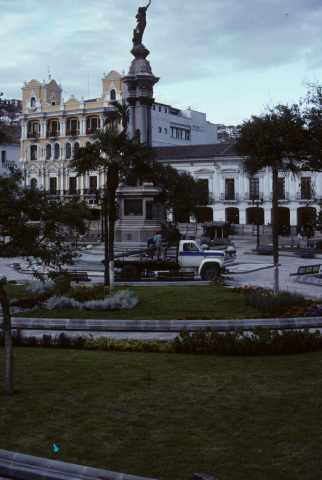
1136091600
Independence plaza in Quito, Ecuador
Workers set up a grandstand in Quito's Independence plaza. Two administrative buildings sit in the background. Independence Plaza is home to most of Quito's main administrative buildings, including Ecuador's Presidential Palace. It is a pedestrian-only area of the city, and tourists will find many fountains, statues, monuments, and churches. Quito is the capital of Ecuador, though with a population of 1,865,541 (2005) it is the second-largest city in Ecuador behind Guayaquil. The urban center of Quito encompasses 112 square miles and is 9,300 feet above sea level.The pre-Colombian city of Quito was destroyed by the last Inca ruler. Therefore, the historic center of the city dates from its founding by Francisco Pizarro in 1534. The historic center of Quito was declared the first world heritage site by UNESCO (United Nations Educational, Scientific, and Cultural Organization). The city of Quito, like much of the central part of Ecuador, is vulnerable to earthquakes and volcanic eruptions. The most destructive earthquake occurred in 1797 when 40,000 people lost their lives. More recently, in 1987 a magnitude 7 earthquake struck Quito killing an estimated 1,000 people.
Creative Commons BY-NC-SA
 1136091600
1136091600